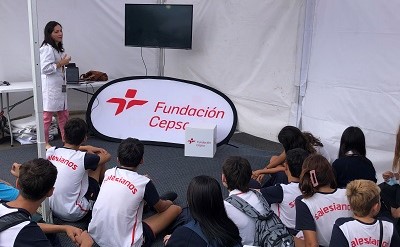- More than 2,500 schoolchildren from the province of Santa Cruz de Tenerife participated in the initiative, which was created by more than 160 researchers from the University of La Laguna
- Adaptation to climate change, consolidation of smart cities, restoration of the oceans, soil, and the fight against cancer were the focus of the program
- The Canary Islands Scientific and Professional Vocations Fair was held within the scope of MacaroNight
This year’s MacaroNight, which in turn is held within the scope of the ‘The Night of European Researchers,’ held in 300 European cities, saw the attendance of around 2,500 primary, secondary, high school, and vocational training students from 32 schools in Tenerife and La Palma. Under the organization of Fundación General Universidad de La Laguna, students were able to see first-hand the work conducted by more than 160 researchers from this academic institution and its associated research centers.
At this edition, MacaroNight focused on the themes of the five new missions established by the European Commission to provide solutions to the major global challenges facing the world up to 2030: adaptation to climate change, the consolidation of smart and climate-neutral cities, ocean restoration, a soil deal for Europe, and the fight against cancer.
The program included a scientific open house with twelve tours guided by research staff of the university institutes at the University of La Laguna (ULL) and the Astrophysics Institute of the Canary Islands (IAC - Instituto de Astrofísica de Canarias), where visitors could see the research conducted at these scientific structures.
In addition, under the title ‘Laboratorio Virtual Conecta Cienci@ULL’ [ULL Science Connect Virtual Laboratory], young researchers from the ULL streamed 20 practical workshops, connecting with schools that had previously received a kit of materials to perform the experiments. Lastly, eight talks were given on science research conducted in the province to promote it among the new generations.
‘Canary Islands Scientific and Professional Vocations Fair’
Among the events included this year under the umbrella of MacaroNight, the two-day ‘Canary Islands Scientific and Professional Vocations Fair’ focused on fostering the interest of young people in science, technology, innovation, and entrepreneurship for the development of their professional future. Fundación Cepsa collaborated actively in this initiative.
The Fair held a ‘Scientific Showcase’ outside the Faculty of Fine Arts with 28 stands demonstrating the research activity conducted at the University of La Laguna and associated R&D centers in different areas of interest to the society of the Canary Islands: renewable energy, sustainability, environment, biodiversity, biomedicine and health, tourism and cultural heritage, and climate change, among others.
Within the scope of the Fair, the Professional Excellence Program — a meeting point where professionals with varying expertise from the business, public, or R&D fields — was held for participants to share their educational background and professional experience in order to motivate and guide the participating students.
In this case, the head of Analytical Services at the Tenerife Refinery, Amayra García, shared her professional experience at Cepsa, from her beginnings as a chemical plant operator, being one of the first women to work in this area, to her current position as head of Analytical Services in the Canary Islands. During her speech, she emphasized the company's new strategy aimed at the ecological transition, encouraging the participating schoolchildren to pursue and education and their professional vocation.
The importance of women in science and technology was also demonstrated through a sample of the ‘Chicas con Cienci@ULL’ [ULL Girls in Science] program, with which the Cepsa Foundation also collaborates throughout the year. The program also saw the attendance of scientists such as the director of the Fundación Cepsa Chair of Ecological Transition and Innovation at ULL, Elena Pastor, as well as Silvia Alonso, Bárbara Socas, Jezabel Molina, and Coromoto León.
Elsewhere, the Almeida Barracks (Santa Cruz de Tenerife) hosted a program of 36 in-person and practical workshops given by young researchers on biomedicine and health, energy, environment and biodiversity, science and technology, science and society, and art.
MacaroNight also served as a meeting point to assess the role of science in the reconstruction of La Palma. Presentations were given by four scientists from the ULL, the Canary Islands Astrophysics Institute, and the Canary Islands Volcanological Institute (INVOLCAN - Instituto Volcanológico de Canarias), who explained the work they are doing to reactivate the island after the eruption of the volcano.

